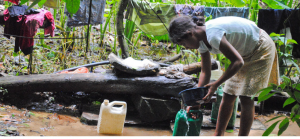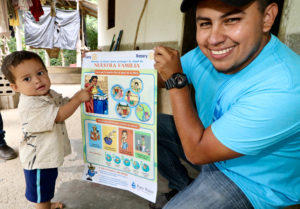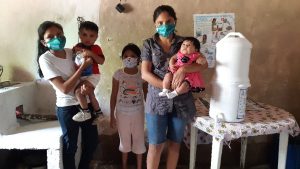Written by Alice Urban, PWW Board Member
Three Ways Pure Water for the World Responds to Environmental Needs
At Pure Water for the World (PWW), our mission is to improve lives by empowering people with access to life’s most basic necessities: safe water and sanitation. We do this by partnering with underserved communities in Central America and the Caribbean to provide the tools and education needed to sustain sustainable safe water, hygiene and sanitation access.
These programs have clear impact on public health by reducing waterborne disease. However, our work has a secondary impact – we support the health of our natural resources and environment.
EHA Connect – which stands for Environment in Humanitarian Action – is a digital tool focused on the humanitarian-environment nexus and supports the mainstreaming of environmental considerations in preparedness, response and recovery. According to EHA Connect, water, sanitation and hygiene (WASH) programming and the environment are inherently linked and interdependent.
“Sustainable WASH outcomes cannot be realized where there are poor environmental conditions or practices. A lack of environmental considerations undermines the effectiveness of WASH interventions, for example through the depletion or contamination of water resources.” (source)
Of course, all WASH projects should adequately account for environmental factors, including the sustainability of ground and surface water supplies, the physical resilience of water and sanitation services to disasters and climate change, and promotion of the sustainable use of natural resources for WASH infrastructure.
At PWW, we work hard to ensure the environmental sustainability of our WASH solutions and to support effective natural resource management. Here are three ways that PWW supports the environment and responds to environmental needs:
Household Environmental Health. Environmental health is the branch of public health concerned with all aspects of the natural and built environment affecting human health. Our comprehensive WASH programming supports improved environmental health at the household and community levels. We ensure our partner communities have the hardware and knowledge needed to maintain a healthy environment.
- Instruction on building latrines that safely separate human waste from human contact,
- Ensuring that families have the information and tools needed to practice safe hand-washing, and
- Providing tools and education so families treat and store their water in a way that significantly reduces the potential for re-contamination.
We conduct water quality testing and monitoring protocols to ensure the effectiveness of WASH programs. All of these factors work together to improve human and environmental health.
Water Resource Management. We partner with rural and underserved communities and are committed to taking a holistic approach to our WASH programming. This goes beyond household water treatment and includes broader support of sound water resource management.
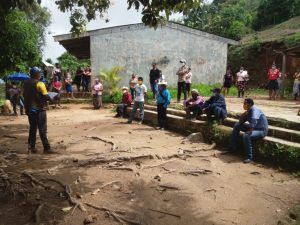 In communities where water access is unreliable or difficult to reach, we support the construction of a water catchment systems.
In communities where water access is unreliable or difficult to reach, we support the construction of a water catchment systems.- We provide training of local water boards. During these trainings, we work with community members to form a committee that focuses on protecting the community’s watershed with reforestation efforts. We talk with water board members about the importance of not contaminating the water sources with pesticides and other harmful chemicals.
- At a household level, installed water filters reduce the amount of CO2 emissions through the reduction of wood burning that homeowners would normally use to boil water for their families.
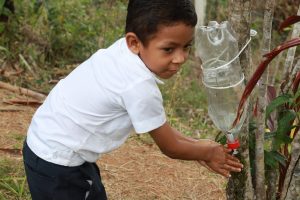 PWW supports the reuse of plastic water bottles for the construction of tippy-tap hand-washing stations (pictured) as well as for solar disinfection of water.
PWW supports the reuse of plastic water bottles for the construction of tippy-tap hand-washing stations (pictured) as well as for solar disinfection of water.- We train girls and women how to make their own reusable sanitary cloth pads. Through this effort, we work to reduce the amount of resources needed to produce disposable products and the amount of waste created by these products.
- The latrines that we teach homeowners to build and those that we construct in schools and communities use very limited amounts of water or no water at all, enabling communities to use their limited water resources more effectively.
Emergency Response for Climate-Related Disaster. In addition to our general programming, PWW proactively responds to acute environmental needs. In 2020, this has included both drought response and hurricane recovery.
These are just three of the ways we have responded to drought in Honduras:
- As an implementing partner of the UNICEF-sponsored “Humanitarian WASH Response to Communities Affected by Drought in the Dry Corridor in Honduras” project, PWW is working with nine water boards to develop Water Security Plans as well as repair wells and gravity-fed water systems. This is coupled with comprehensive WASH training and filter installation for more than 1,300 families. These communities face an acute need for clean water in the face of very limited water resources.
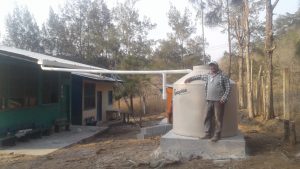 At schools, rain water harvesting systems are installed, ensuring at least 3 liters of water per day during the dry season to keep children learning at school, rather than spending their school hours fetching water.
At schools, rain water harvesting systems are installed, ensuring at least 3 liters of water per day during the dry season to keep children learning at school, rather than spending their school hours fetching water.- In homes, families in the dry corridor often use handmade wells to collect water. This water is not potable. Clean water filters improve the poor quality of the water resources, making it safe to drink any time of the year.
Additionally, Hurricane Eta and Hurricane Iota, two unprecedented late-season storms in 2020, ravaged Trojes and Maraita, Honduras, where PWW teams live and work. The storms caused significant environmental damage, tearing down hillsides, washing out roads, destroying family homes and farmland, as well as safe water and sanitation systems.
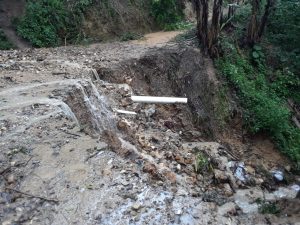 PWW is working with local government to restore clean water and safe sanitation access while building community resilience to future environmental threats. These natural disasters, exacerbated by climate change, emphasize the need for resilient WASH services that help keep our natural environment safe and free of contaminants.
PWW is working with local government to restore clean water and safe sanitation access while building community resilience to future environmental threats. These natural disasters, exacerbated by climate change, emphasize the need for resilient WASH services that help keep our natural environment safe and free of contaminants.
PWW is helping to establish Security Plan Committees, in which local leaders from health centers, water boards, and the municipality work together to identify possible risks and work to improve their systems to keep quantity and quality of water in-tact during emergencies related to climate change as well as other environmental impacts.
PWW’s vision is a world in which all people have safe water, proper sanitation and the knowledge to sustain it for future generations. PWW is committed to sound environmental practices and reducing community vulnerability to environmental threats, while supporting long-term safe water and sanitation systems that enable communities to thrive for future generations.

